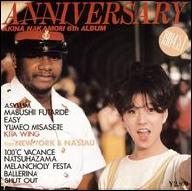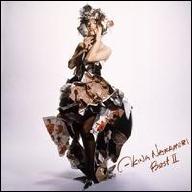Born in Tokyo in 1965, Nakamori showed a knack for the performing arts from kindergarten age, and by 14 she entered a popular talent search TV show, winning it on her third attempt in 1981, when she scored the top result in the show's history, as well as a deal with Warner Pioneer. Her debut single, Slow Motion, recorded in Los Angeles, reached a modest number 39, but its follow-up, Shoujo A, a song about a motorcycle-riding girl, took the number five slot, boosted by the media buzz generated by a proposed ban on its lyrics. The more conventional ballad Second Love, Nakamori's third single, set her personal record, selling 766,000 copies during its chart run and close to one million in total sales, with nine weeks at the top of the charts. Nakamori didn't miss the chance to strike while the iron was hot, and released two studio albums in 1982, with Prologue selling 453,000 and Variation 743,000 units, as well as two albums (Fantasy and New Akina Entranger), a compilation, and another slew of singles in 1983. All her full-length releases topped the charts, and all her singles sold more than 400,000 units. The winning streak went on for some more years, during which the sales of her singles averaged 500,000 to 600,000 copies, and most of her releases claimed the number one spots on the Oricon charts. She had her acting debut in 1985, starring in the movie #Aitabidachi with Kondo Masahiko, who became her boyfriend. That year and in 1986 she also won the Japan Record Taisho Grand Prix.
Nakamori's maturing musical style was mirrored in the more adventurous album Fushigi (1986), but it also marked a time when her sales began to slump. She still went on to claim number one slots, but sales declined to around 300,000 to 400,000 copies per record, although her tenth studio album, Crimson, shifted 601,000 copies, and the compilation Best 1 sold 766,000 units. In 1987 Nakamori took a stab at conquering the Western market, but her "English" album, Cross My Palm, bombed due to her heavy accent and a lack of promotion. That year she was also dumped by Masahiko, to the agitation of tabloids, which had been accusing him of clinging to her fame. She held on through 1988, but gave ground to rumors of anorexia in the meantime, and finally made a half-hearted suicide attempt in Masahiko's apartment in 1989. The trip down the spiral was completed by her receding to Hawaii to indulge in a drinking binge.
Nakamori more or less pulled herself together in 1990, when she released her "comeback" single, Dear Friend, but the '90s turned out to be a tough time altogether. She switched labels several times (from Warner to MCA Victor in 1992, then to Gauss in 1998, Raku Koubou in 2000, and Universal in 2002) and dropped music for a while, focusing on her acting career -- her most successful appearance was the main role in the TV drama #Sugao No Mamade. She released some singles and the cover album Utahime, and in 1996 plotted another comeback, which wasn't a big success -- the single Moonlight Shadow Tsukinihoero only charted at number 14. Four albums in the late '90s broke no new commercial ground for her either, and in 1999 she even faked a hospitalization to get the public's attention back. Things took a turn for the better in 2002, when Universal attempted to re-brand Nakamori as "the Japanese Jennifer Lopez," this new approach documented on the albums Resonancia (2002) and I Hope So (2003). Another album, Destination, was delivered in 2006, although by that time Nakamori had the right to retire with a clear conscience, seeing that she already had 17 albums and 21 singles at number one in the Oricon charts. ~ Alexey Eremenko, Rovi











